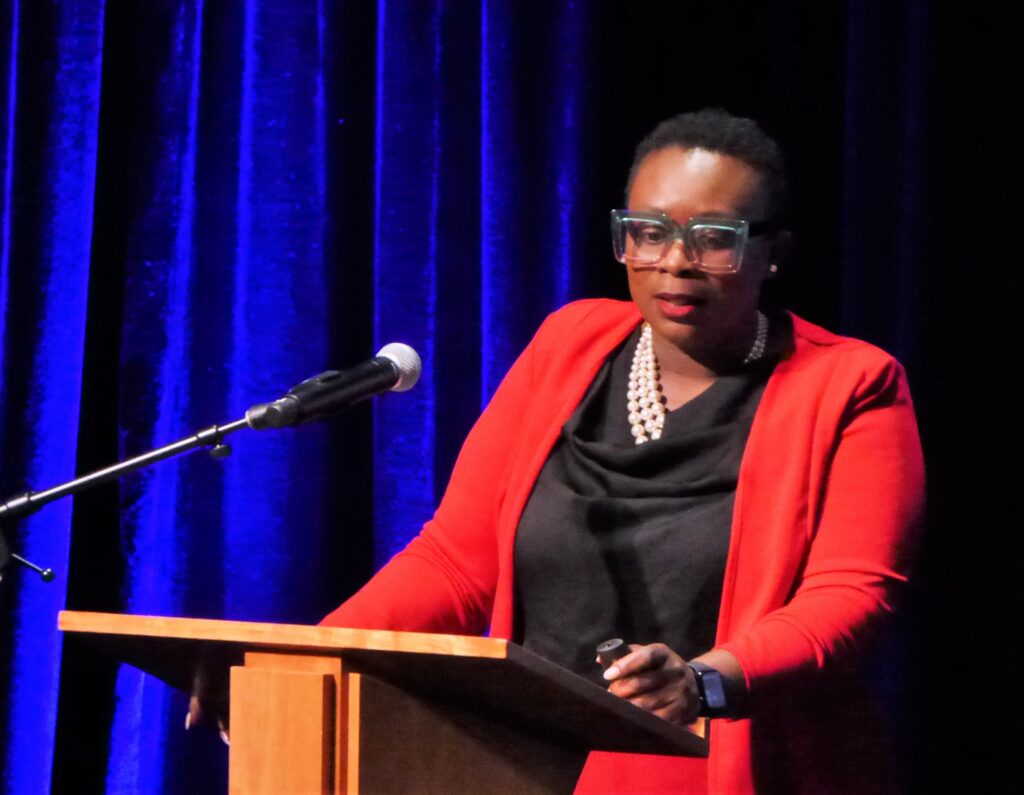(This article is part of One United Lancaster’s reporting on the Zero Hunger summit.)
Hunger, state Sen. Carolyn Comitta said, “is something that we can solve if we work together, taking action in our own communities.”
Comitta, a Chester County Democrat, is a member of the Pennsylvania Legislative Hunger Caucus, a bipartisan coalition working to fight food insecurity. She spoke to Millersville’s “Zero Hunger” summit via teleconference about state efforts to support the charitable food network and ensure families have enough to eat.
Comitta pointed out that Pennsylvania is a leader in food production, yet an estimated 1.5 million Pennsylvania residents, including more than 400,000 children, go hungry.
Part of the current pressure, she said, stems from the pandemic and its disruptions.
“We had that additional challenge,” she said.
The Legislative Hunger Caucus supports efforts to improve food banks’ infrastructure and overall capacity. One such effort: The COVID-19 Food Bank Cold Storage Infrastructure Program, which provided $11.4 million statewide from federal pandemic relief funds to help food banks in all 67 counties buy refrigerators, freezers and refrigeration-equipped vehicles.
Comitta said she also championed the Hunger-Free Campus program, which was launched by then-First Lady Frances Wolf at Millersville University last year.
The program has been supported in part by federal pandemic funds. The need now is to greenlight adequate continued funding, Comitta said.
SNAP and WIC
By far the biggest impact on food insecurity in Pennsylvania is provided by two federal programs: The Supplemental Nutrition Assistance Program, or SNAP, and the Special Supplemental Nutrition Program for Women, Infants and Children, or WIC.
In February, SNAP ended the higher payments implemented during the pandemic, reducing payments by around $100 per person on average.

An estimated 1.8 million Pennsylvanians are on SNAP, or about 14% of the population. Another 170,000 use WIC each month, said Sally Zubairu-Cofield, director of Pennsylvania’s WIC Bureau.
The bureau is working to improve its responses to hunger, she said. One of the big successes is the deployment of mobile units that distribute food in local neighborhoods. Many WIC recipients don’t have cars, and transportation is a barrier for them.
When Pennsylvania pioneered this practice, she said, other states were skeptical, but it has seen a lot of success.
“We want to make the experience as easy as possible,” she said. “We’re really trying to reduce the burden … We hope this will allow people to really make use of the benefits.”
Zubairu-Cofield herself applied for WIC assistance at the age of 19. As someone expecting a new child at that age, she said, she was hoping for a better experience with the agency, but found a lot of barriers and issues.
“That stuck with me for a long time,” she said, describing how, after encountering scornful attitudes and the stigma of using the agency’s food benefits, she ended up declining to go through with the transaction, leaving everything on the counter at the store, and figuring out other ways to survive financially.
“I didn’t want to be walking around a grocery store with these yellow checks,” she said.
Years later, she applied for a job at the same WIC office.
“I had a point to prove,” she said. What she found, she explained, was that the agency’s staff members often have their own struggles and challenges that can affect their work. She has now been with WIC for 14 years.
“One thing that I do know,” Zubairu-Cofield said, “when you’re serving a community, you have to understand your purpose … Hunger looks different to different types of people.”
She recognizes the frustration caused by seemingly arbitrary cutoff levels for receiving benefits.
“I’ve served so many people who have been one cent over,” she said. “Sometimes is just not worth it (to apply).”
Parents face a lot of stress, she said. She talked about a situation where she forgot to load her child’s student lunch account, and he skipped a meal.
“That’s hunger – it’s here, it’s real,” she said, talking about many of the ways that people and families can find themselves falling behind, or confused by what they are facing. “Life happens.”






